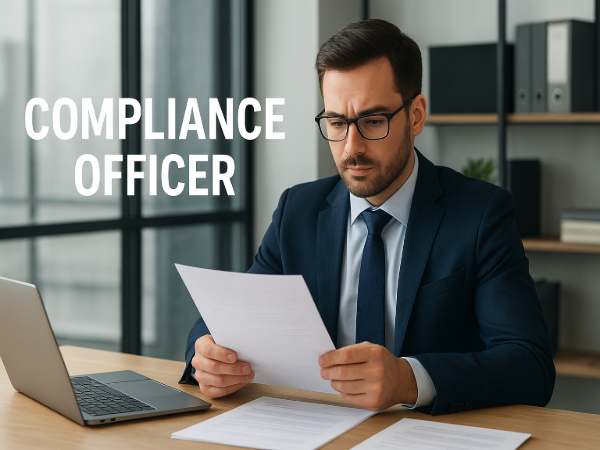Compliance Officer: The Guardian of Corporate Integrity and Legal Accountability
Understanding the Role, Responsibilities, Skills, and Importance of a Compliance Officer in Today’s Business World

A compliance officer is a professional responsible for ensuring that a company adheres to legal regulations, industry standards, and internal policies. They monitor, assess, and manage compliance risks across an organization, helping prevent violations that could lead to legal penalties, financial losses, or reputational damage. By designing compliance programs, conducting audits, training employees, and maintaining transparent reporting systems, compliance officers safeguard an organization’s integrity and promote a culture of accountability and ethical business conduct.
Introduction
In today’s complex and fast-evolving regulatory environment, businesses operate under a growing number of laws and ethical standards. Compliance isn’t just about following rules—it’s about building trust, sustainability, and credibility. This is where the role of the compliance officer becomes critical. These professionals act as the organization’s moral and legal compass, ensuring that every business operation aligns with both external regulations and internal ethical frameworks.
The compliance officer’s influence reaches every corner of an organization, from finance and human resources to operations and risk management. Without their diligent oversight, companies risk falling into costly legal traps, losing stakeholder trust, or damaging their reputations beyond repair.
Who Is a Compliance Officer?
A compliance officer is a trained specialist responsible for overseeing and enforcing a company’s adherence to laws, regulatory guidelines, and internal codes of conduct. Their primary mission is to prevent violations before they occur, not merely react to them after the fact.
They serve as both advisors and enforcers, guiding the company’s leadership on ethical practices while ensuring that operational teams follow compliance protocols. These professionals are crucial in industries like finance, healthcare, energy, manufacturing, and technology—where legal frameworks are especially complex and closely monitored by regulators.
In short, a compliance officer acts as the guardian of organizational ethics, ensuring that business growth doesn’t come at the expense of integrity or legality.
The Core Responsibilities of a Compliance Officer
The compliance officer’s role is broad and multifaceted, encompassing several critical duties that uphold an organization’s commitment to lawful and ethical operations.
Developing and Implementing Compliance Policies
The first step in building a culture of compliance is creating strong internal policies. Compliance officers draft, update, and implement policies that align with local and international regulations. These guidelines serve as the foundation for all compliance-related actions within the organization.
Conducting Risk Assessments
Every business faces risks—from data privacy breaches to financial misreporting. Compliance officers perform regular assessments to identify potential areas of non-compliance. By evaluating the likelihood and impact of these risks, they help executives make informed, risk-conscious decisions.
Monitoring and Auditing Operations
Compliance officers actively monitor daily operations to ensure that teams follow established rules. Through internal audits and compliance checks, they identify weaknesses in systems or processes and recommend corrective measures before issues escalate.
Training and Awareness Programs
One of the most valuable roles of a compliance officer is education. They organize training programs and workshops to make employees aware of their responsibilities under the law and the company’s internal guidelines. This proactive education helps prevent violations due to ignorance or oversight.
Investigating and Reporting Violations
When a potential breach of compliance occurs, the officer steps in to investigate. They gather facts, interview relevant employees, and document findings. Based on the evidence, they recommend disciplinary actions or process improvements. Transparent reporting ensures accountability throughout the organization.
Liaising with Regulatory Bodies
Compliance officers act as intermediaries between the company and external regulators. They prepare reports, submit necessary documentation, and communicate with authorities to demonstrate the organization’s adherence to laws and standards.
Why Is a Compliance Officer Important?
The importance of a compliance officer goes beyond avoiding fines or lawsuits. Their work protects the company’s most valuable asset—its reputation.
-
Legal Protection: Compliance officers prevent costly legal consequences by ensuring adherence to evolving regulations.
-
Reputational Safeguard: A single compliance breach can destroy years of brand trust. Officers ensure consistent ethical behavior across the company.
-
Operational Efficiency: Through process monitoring, they identify inefficiencies and recommend improvements that enhance productivity.
-
Investor Confidence: Investors favor companies with robust compliance systems, viewing them as low-risk, transparent, and trustworthy.
In essence, the compliance officer acts as both a shield and strategist, protecting the company while fostering long-term growth through integrity.
Essential Skills of a Successful Compliance Officer
To perform their role effectively, compliance officers must possess a unique blend of technical knowledge, analytical ability, and interpersonal skills.
-
Regulatory Knowledge: They must stay informed about the latest laws and industry standards.
-
Analytical Thinking: The ability to interpret complex data and identify hidden risks is vital.
-
Ethical Integrity: As the moral compass of the company, a compliance officer must remain unbiased and principled.
-
Communication Skills: They must explain complex regulations in simple terms to employees at all levels.
-
Attention to Detail: Small oversights can lead to major compliance failures.
-
Leadership: They must inspire employees to uphold compliance values, not just enforce rules.
Educational Background and Career Path
Most compliance officers hold a bachelor’s degree in law, finance, business administration, or accounting. Many pursue specialized certifications such as Certified Compliance & Ethics Professional (CCEP), Certified Regulatory Compliance Manager (CRCM), or Certified Fraud Examiner (CFE).
Career progression typically follows this path:
-
Junior Analyst or Assistant Compliance Officer – learning regulations and internal processes.
-
Compliance Specialist or Manager – leading specific compliance areas like data privacy or financial auditing.
-
Head of Compliance / Chief Compliance Officer (CCO) – overseeing the entire compliance department and advising senior leadership.
As organizations face more stringent regulations globally, the demand for compliance professionals continues to grow, offering stable and rewarding career opportunities.
Challenges Faced by Compliance Officers
Despite their vital role, compliance officers face numerous challenges:
-
Evolving Regulations: Laws change rapidly, requiring constant adaptation.
-
Data Overload: Managing vast volumes of compliance data can be overwhelming.
-
Balancing Business Goals: They must enforce compliance without hindering innovation or profitability.
-
Cultural Resistance: In some organizations, employees view compliance as restrictive rather than protective.
-
Resource Constraints: Many compliance teams operate with limited budgets, making enforcement difficult.
To overcome these challenges, successful compliance officers combine regulatory expertise with creativity, leveraging technology and communication to make compliance easier and more integrated into daily work.
Technology and the Future of Compliance
With digital transformation reshaping industries, compliance is also evolving. Artificial intelligence, data analytics, and automation are now integral tools for modern compliance officers.
-
AI-Powered Monitoring: Systems can detect unusual patterns or potential fraud in real-time.
-
Automated Reporting: Technology reduces human error and speeds up compliance documentation.
-
Data Protection: As cyber risks rise, compliance officers work closely with IT teams to ensure data privacy and cybersecurity compliance.
The future compliance officer will not only need legal and ethical expertise but also technological fluency.
The Role of Compliance in Corporate Culture
A strong compliance culture doesn’t emerge overnight—it’s cultivated through leadership, training, and example. The compliance officer plays a pivotal role in promoting this mindset across all levels of the organization.
When employees understand that compliance isn’t about punishment but protection, they become proactive participants in maintaining ethical standards. This cultural shift creates a sustainable business environment built on honesty, transparency, and accountability.
How to Become a Compliance Officer
If you aspire to become a compliance officer, follow these steps:
-
Get the Right Education: Pursue a degree related to business, finance, or law.
-
Gain Industry Experience: Work in auditing, risk management, or legal departments.
-
Obtain Certifications: Specialized compliance credentials can enhance credibility.
-
Develop Soft Skills: Communication, leadership, and negotiation are critical.
-
Stay Updated: Regulatory landscapes change frequently—continuous learning is key.
Conclusion
The compliance officer stands as one of the most crucial figures in modern organizations. They embody integrity, accountability, and diligence—values that sustain business success in a world of constant scrutiny. By ensuring adherence to legal, ethical, and internal standards, they not only protect their company but also build its reputation as a responsible and trustworthy entity.
In an era where corporate misconduct can go viral overnight, compliance officers serve as the ultimate safeguard—balancing business ambitions with ethical obligations. Their work may often be behind the scenes, but its impact is felt everywhere integrity matters.



